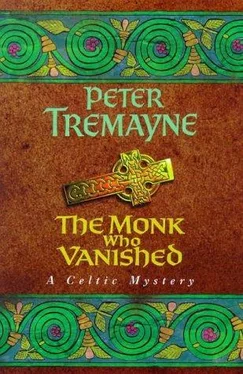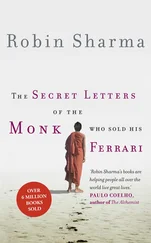Peter Tremayne - The Monk Who Vanished
Здесь есть возможность читать онлайн «Peter Tremayne - The Monk Who Vanished» весь текст электронной книги совершенно бесплатно (целиком полную версию без сокращений). В некоторых случаях можно слушать аудио, скачать через торрент в формате fb2 и присутствует краткое содержание. Жанр: Исторический детектив, на английском языке. Описание произведения, (предисловие) а так же отзывы посетителей доступны на портале библиотеки ЛибКат.
- Название:The Monk Who Vanished
- Автор:
- Жанр:
- Год:неизвестен
- ISBN:нет данных
- Рейтинг книги:3 / 5. Голосов: 1
-
Избранное:Добавить в избранное
- Отзывы:
-
Ваша оценка:
- 60
- 1
- 2
- 3
- 4
- 5
The Monk Who Vanished: краткое содержание, описание и аннотация
Предлагаем к чтению аннотацию, описание, краткое содержание или предисловие (зависит от того, что написал сам автор книги «The Monk Who Vanished»). Если вы не нашли необходимую информацию о книге — напишите в комментариях, мы постараемся отыскать её.
The Monk Who Vanished — читать онлайн бесплатно полную книгу (весь текст) целиком
Ниже представлен текст книги, разбитый по страницам. Система сохранения места последней прочитанной страницы, позволяет с удобством читать онлайн бесплатно книгу «The Monk Who Vanished», без необходимости каждый раз заново искать на чём Вы остановились. Поставьте закладку, и сможете в любой момент перейти на страницу, на которой закончили чтение.
Интервал:
Закладка:
‘Very well,’ agreed Fidelma. ‘I cannot flaw your logic. So the Brother from the abbey met with the archer.’
‘There is another thing which confirms that this religieux came in search of the archer.’
‘What?’
‘Several days later he came again to the inn, this time in broad daylight and with another member of his community. The Brother asked Cred where the archer was. He was not there, so this religieux and his companion left.’
‘Did you see this religieux or his companion again?’
‘No. But there is something else and something more important. I saw the archer meet another man later on the same night that the religieux paid his first visit to the inn. I was disturbed in my sleep and I heard voices below my window in the courtyard of the tavern. Curious, I peered out. There were two men there, one of them holding a horse. They were engaged in conversation. They were standing underneath the tavern light.’
One of the duties, enforced by law on all tavern keepers, was that a light had to be kept burning during the night to guide travellers to the hostel, whether it was situated in the countryside or in the town.
The driver suddenly coughed, a racking cough. Then he recovered himself. ‘One of the men was, of course, the archer.’
‘The other?’ pressed Eadulf eagerly. ‘Did you recognise the other man?’
‘No. He had a cloak and hood over him. I can tell you this. He was a man of rich apparel. His cloak was of wool, edged with fur. There was little else that I could see but it was the horse with its saddle and bridle which really showed a richness few people could afford. Anyway, I tried to listen to their conversation. I could tell but little. The archer was very respectful of the man in the cloak. Then …’
The driver hesitated and started coughing again. Fidelma and Eadulf waited patiently until he had regained his composure.
‘Then the fine lord said, well … I think it was an old proverb. Ríoghacht gan duadh, ní dual go bhfagthar.’
‘No kingdom is to be obtained without trouble,’ repeated Fidelma softly. ‘It is, indeed, an old proverb meaning that without pain you do not gain anything.’
The driver was coughing again.
‘It is a bad cough for you to be seated on the damp ground with,’ chided Eadulf.
The driver went on as if he had not heard him. ‘The archer responded. He said, “I will not be found wanting, rígdomna.” His exact words.’
Fidelma started forward, her body suddenly tense. ‘Rígdomna? Are you sure that he used that form of address?’
‘He did so, Sister,’ replied the driver.
Eadulf looked at Fidelma in the deep gloom which had now descended over the field. ‘That word is a title for a prince, isn’t it?’
The term meant literally ‘king material’ and was an official term of an address to the son of a king.
The driver was coughing again.
‘What is the matter with you?’ demanded Fidelma, beginning to wonder at the man’s condition.
The driver gasped for breath. ‘I think that I will have to ask you to help me back to the town, for I fear I cannot make it by myself.’
He started to move and then began to cough again. Abruptly he gave a curious whining cry and fell forward onto his side.
Eadulf dropped his staff and knelt down in the darkness, for dusk and mist had combined so swiftly as to obscure all details from their sight. He reached for the man’s head and felt along the neck for a pulse. He found it fluttering and then it stopped.
‘What is it?’ asked Fidelma impatiently.
Eadulf stared up, unable to see her features. ‘He is dead.’
Fidelma gave a sharp intake of breath. ‘Dead? How can that be?’
Eadulf felt a still-warm and wet substance at the corner of the man’s mouth.
‘He has been coughing blood,’ he said in surprise. ‘We would have noticed it had it been light.’
‘But the man did not look ill earlier. He did not appear to be the sort to cough blood.’
Eadulf bent forward and tried to bring the body back into an upright seated position. His left hand was trying to act as a brace for the back of the man when he felt the same warm, sticky substance over the man’s back. There was a tear in the man’s shirt and Eadulf’s fingers touched the ragged, torn flesh.
‘Oh, dabit deus his quoque finem !’ he muttered in the dark.
‘What is it?’ Fidelma was frustrated as it was too gloomy now to see exactly what Eadulf was doing.
‘The man has been stabbed in the back. He lay here talking with us all the while he was mortally wounded. God knows how he survived. He has been stabbed in the back …’ Eadulf paused. ‘The very movement he made to get up must have ruptured his wound further and caused his death. Maybe he would have lived had he not moved. I don’t know.’
Fidelma remained silent for a moment.
‘He should have spoken up before,’ she said eventually, articulating a brutal realism. ‘We cannot help him now.’
Eadulf reached for the well bucket which was full of the water and cleaned the blood from his hands.
‘Shall I carry his body back to the inn?’ he asked. ‘We should tell Samradan.’
Fidelma shook her head in the gloom before realising that it was too dark for Eadulf to see the negative gesture.
‘No. If we announce our involvement with this man we might be prevented from following up the information he has given us.’
‘How so? The man was stabbed in the back. Murdered. He was on his way to meet with us. When he arranged the meeting this afternoon he feared to be seen talking with us. Whom did he fear? Whoever it was must have killed him to prevent him passing on information.’
‘We do not know that for certain. But I am inclined to agree. If he was killed to prevent him telling us what he knew then it would be wiser to let whoever killed him believe that he was unable to speak with us. We must keep quiet about this. He will be found tomorrow when someone comes to the well. We will work on the assumption that he was killed to keep him silent, and we should pretend he kept that silence.’
‘I do not like it,’ confessed Eadulf. ‘It seems an unChristian thing to do, simply to go away and leave him thus.’
‘He will not mind and, as we are in pursuit of justice, neither will God. It might be an advantage in tracking his killers for if they are connected with our assassin friends then we have learnt something important which gives us a small advantage.’
She knelt down beside the body and uttered a short blessing before standing up.
‘Sic itur ad astra,’ muttered Eadulf sarcastically. Thus one goes to the stars.
Eadulf was suddenly aware of the continued howling of the wolves which seemed to have grown closer while they had been talking atthe well. He picked up his staff, which he had let fall when he had examined the body, and turned to Fidelma.
‘We’d best start back.’
Fidelma was in agreement. She, too, had noticed the growing nearness of the sound of the wolves.
They went back across the field and climbed over the short stone wall which bordered the field and onto the track. The moon was up now, a bright mid-September moon. It seemed no longer dark. There were a few clouds in the sky but they did not obscure the pale white brightness. The gloom and mist had only hung in the field around the well, encouraged by the dampness. Here on the track the darkness had been dissipated and the pallid light cast shadows across the lane as they hurried towards the distant lights of the township.
The rising cry of the wolves caused an involuntary shudder, not for the first time, to tingle its way down Eadulf back.
He cast a nervous glance around. ‘They sound as if they are pretty near,’ he muttered.
Читать дальшеИнтервал:
Закладка:
Похожие книги на «The Monk Who Vanished»
Представляем Вашему вниманию похожие книги на «The Monk Who Vanished» списком для выбора. Мы отобрали схожую по названию и смыслу литературу в надежде предоставить читателям больше вариантов отыскать новые, интересные, ещё непрочитанные произведения.
Обсуждение, отзывы о книге «The Monk Who Vanished» и просто собственные мнения читателей. Оставьте ваши комментарии, напишите, что Вы думаете о произведении, его смысле или главных героях. Укажите что конкретно понравилось, а что нет, и почему Вы так считаете.












